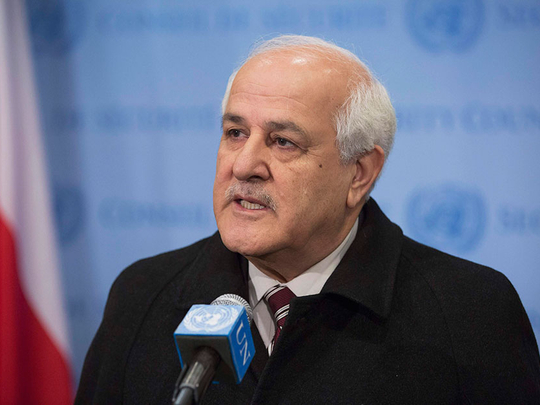
United Nations: Palestine took the last formal step on Friday to join the International Criminal Court, seeking to pursue war-crimes charges against the Israeli regime over the recent conflict in Gaza and Jews-only colonies in Palestinian territories.
The high-stakes move has drawn threats of retaliation from the Israelis and is vehemently opposed by the US as an obstacle to reaching an Israeli-Palestinian peace deal.
After submitting the documents to join the ICC, Palestinian Ambassador Riyad Mansour said the Palestinians are seeking to raise alleged crimes committed by the Israelis, including during last summer’s war in Gaza. He said the Palestinians will also seek justice for Israeli colonies on Palestinian territory, which he said constitute “a war crime” under the Rome statute that established the court.
“This is a very significant step,” Mansour told reporters. “It is an option that we are seeking in order to seek justice for all the victims that have been killed by Israel, the occupying power.”
The Palestinians moved quickly to join the court after suffering a defeat in the UN Security Council, which rejected a resolution on Tuesday that would have set a three-year deadline for the establishment of a Palestinian state on lands occupied by the Israelis.
Joining the ICC is part of a broader strategy to pressure the regime into withdrawing from the territories and agreeing to Palestinian statehood.
Palestinian President Mahmoud Abbas has been under heavy domestic pressure to take stronger action against the Israelis after a 50-day war on Gaza over the summer, tensions over holy sites in Occupied Jerusalem and the failure of the last round of US-led peace talks. He signed the documents to join the ICC a day after the Security Council rejected the resolution.
Mansour said Palestinian leaders are studying “all options” including going back to the Security Council, whose incoming members are viewed as more favourable or to the General Assembly where there are no vetoes.
Israeli Prime Minister Benjamin Netanyahu immediately vowed to take unspecified “retaliatory steps.” The US State Department said the Palestinian decision would only set back the aspirations of the Palestinian people for an independent state.
Mansour delivered the paperwork to Assistant Secretary-General for Legal Affairs Stephen Mathias, who said the UN will examine them to ensure that they are in proper form.
Mansour said it will take about 60 days under ICC rules for the state of Palestine to become the 123rd member of the court.
Mansour said the Palestinians delivered a letter on Thursday night to the registrar of the ICC in The Hague requesting that the court consider alleged crimes committed during the Gaza war “and reserving our right for other retroactive crimes committed by Israel.” He said he would be meeting with an official from the registrar’s office in New York later on Friday to discuss the issue.
Former ICC prosecutor Luis Moreno Ocampo said in an interview in August that the Palestinians have the right to decide that the court has jurisdiction dating back to November 2012, when the UN General Assembly voted overwhelmingly to upgrade the Palestinians’ status from a UN observer to a non-voting observer state. Ocampo said there should be “no discussion” on that.
The General Assembly’s recognition of Palestine as an observer state made it possible for the Palestinians to join the International Criminal Court and other UN bodies.
Once it becomes a member, Palestine could seek to have Israeli military or political figures prosecuted for alleged crimes involving colony construction on occupied lands or actions by the military that cause heavy civilian casualties.
“Palestine’s move to join the ICC means that individuals implicated in war crimes committed in or from Palestinian territory could be held to account,” said Balkees Jarrah, international justice counsel at Human Rights Watch. “Giving the court a mandate may deter the abuses that fuel animosity and make returning to peace talks more difficult — whether [colony] expansion, Israeli attacks on civilians in Gaza, or unlawful Hamas rocket strikes.”
But joining the court also exposes the Palestinians themselves to charges of war crimes over rocket attacks by Hamas on Israeli population centres and other violence against Jewish targets.
Mansour said the Palestinians aren’t afraid.
“We uphold the law so high, and we are not afraid of the judgement of the law, especially international law,” he said.
Mansour also delivered documents to the UN on Friday for Palestine to join 15 other UN conventions, treaties and agreements.
These include the Nuclear Nonproliferation Treaty, the Law of the Sea convention, and the convention lifting the statute of limitations for war crimes and crimes against humanity. The Palestinians also seek to join conventions against transnational organised crime, and on the political rights of women, biological diversity, movement of hazardous waste and the safety of UN personnel.
A US official warned of consequences.
“It should come as no surprise that there will be implications for this step, but we continue to review,” said the official, speaking on condition of anonymity because he was not authorised to speak publicly.












